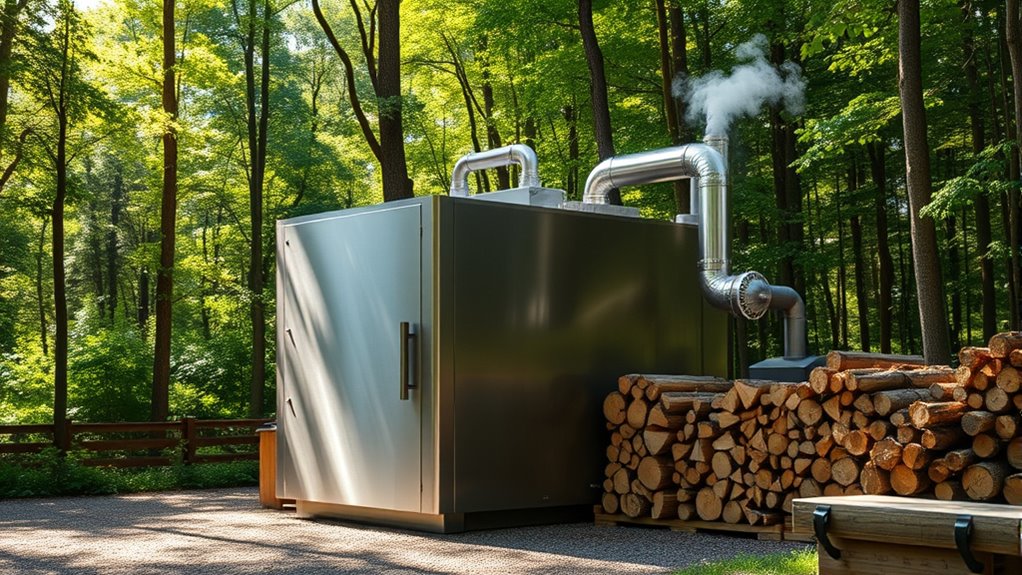Biomass boilers burn organic fuels like wood pellets, chips, or agricultural waste to produce heat efficiently and sustainably. They lower greenhouse gases by utilizing renewable resources and emit fewer pollutants, helping improve air quality. Advances in technology have boosted their efficiency, making them suitable for industrial, community, and residential use. With growing policy support and innovative designs, biomass boilers are becoming a key part of cleaner energy solutions—exploring further reveals how they can benefit your energy needs.
Key Takeaways
- Biomass boilers utilize renewable organic fuels like wood and agricultural waste, reducing reliance on fossil fuels.
- They significantly lower greenhouse gas emissions by creating a carbon-neutral cycle through biomass combustion.
- Modern biomass boilers feature high efficiency (80-90%) and advanced emission control systems, supporting cleaner air quality.
- Adoption is supported by government policies, incentives, and sustainable sourcing practices promoting long-term viability.
- They offer scalable solutions for various industries and community heating, advancing sustainable energy transition goals.
Understanding Biomass Boilers and Their Operation
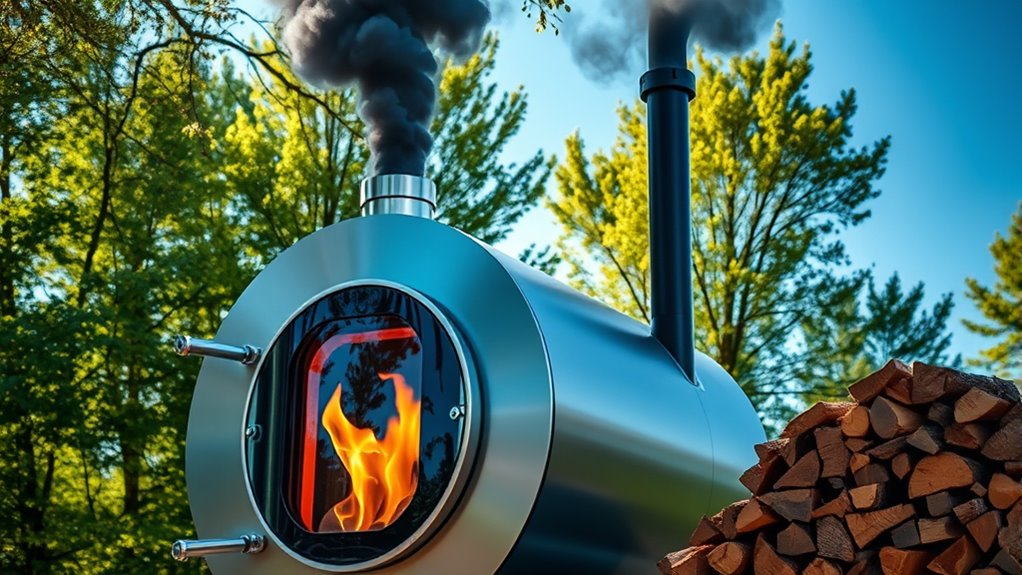
Have you ever wondered how biomass boilers generate heat from renewable sources? These systems burn organic fuels like wood pellets, chips, or logs in a combustion chamber, producing heat that’s transferred to water through heat exchangers. The heat transfer process heats water or creates steam for heating or power. Modern biomass boilers feature automated fuel feeding, ensuring a steady supply to the combustion chamber, which improves efficiency and reduces emissions. The combustion process converts biomass energy into heat, with efficiencies typically between 80% and 90%, depending on fuel quality and boiler design. Well-maintained heat exchangers maximize heat transfer, making biomass boilers a reliable, renewable fuel solution for sustainable heating. Additionally, automated fuel feeding technology helps optimize combustion efficiency and reduce manual labor. This efficient operation highlights biomass boilers’ role in renewable energy technology.
Types of Biomass Fuels Suitable for Boilers
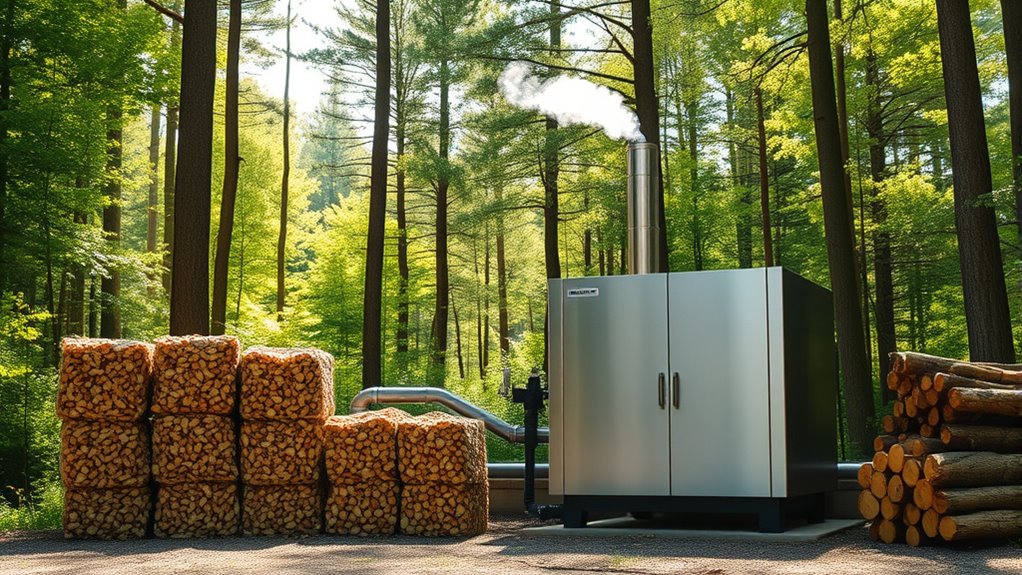
Did you know that selecting the right biomass fuel is essential for ideal boiler performance? Different biomass fuels suit different boiler types and optimize combustion efficiency. Wood pellets, with high calorific value and low moisture content, burn cleanly and efficiently. Wood chips are larger, requiring specific boilers designed for organic matter. Agricultural residues like rice husks and cotton waste are sustainable options, turning waste into energy. In tropical regions, coconut shells and palm kernel shells are popular due to their high calorific value. Here’s a quick overview:
| Biomass Fuel | Key Characteristics |
|---|---|
| Wood Pellets | High energy density, low moisture |
| Wood Chips | Larger size, suitable for specialized boilers |
| Agricultural Residues | Abundant, eco-friendly, variable moisture |
| Coconut/Palm Shells | High calorific value, widely available |
| Organic Matter | Versatile, depends on moisture and ash content |
Additionally, understanding the combustion process of each fuel type can help optimize boiler efficiency and reduce emissions. Recognizing the fuel storage requirements is also crucial to maintain quality and safety during operation. Proper storage conditions can prevent spoilage and moisture absorption, which could otherwise negatively impact energy output and emissions. Moreover, selecting the right fuel quality can significantly influence overall performance and longevity of the biomass boiler. Being aware of emission standards can also aid in choosing fuels that meet environmental regulations and promote cleaner combustion.
Environmental Benefits and Emission Reductions
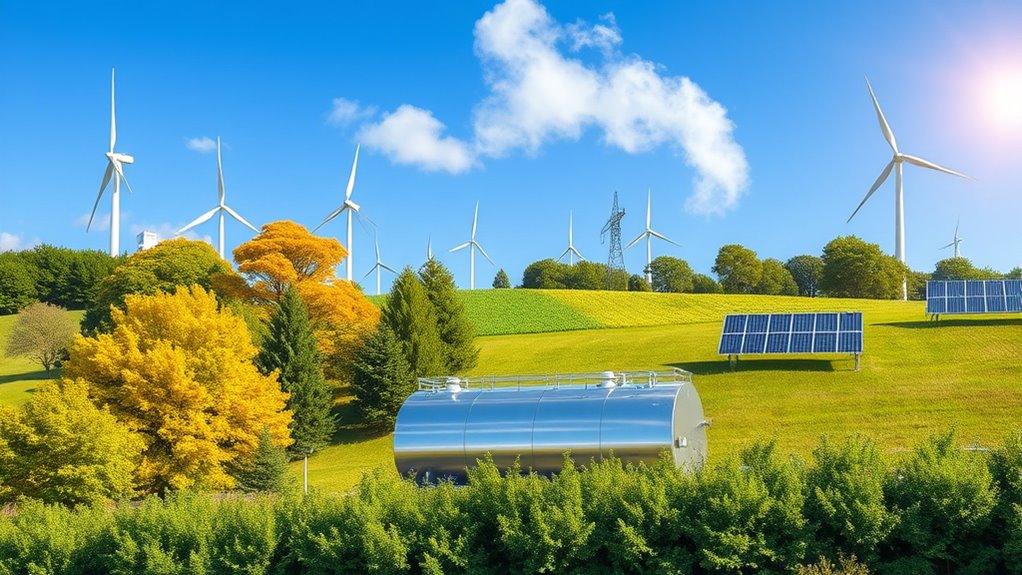
Switching to biomass boilers can substantially cut your greenhouse gas emissions, helping fight climate change. By using renewable fuels, you’ll depend less on fossil fuels, reducing pollution and conserving resources. Plus, biomass boilers produce cleaner air by lowering harmful pollutants like SO₂ and NOₓ, improving local air quality. Additionally, adopting biomass energy can foster sustainable relationships, as it aligns with eco-friendly practices and promotes environmental responsibility. Incorporating sound design principles into educational campaigns can effectively communicate these environmental benefits to the public. Moreover, understanding the emission reductions achieved through biomass boilers can motivate communities to adopt greener energy solutions.
Lower Greenhouse Gas Emissions
Biomass boilers considerably lower greenhouse gas emissions compared to traditional fossil fuel systems, making them an effective tool for reducing your carbon footprint. By using renewable, biomass fuels, these systems achieve up to 80% reduction in emissions through cleaner combustion processes. When sustainably sourced, biomass fuels absorb as much CO₂ during growth as they release during combustion, creating a carbon-neutral cycle that supports pollution reduction and environmental benefits. This balance helps you meet climate goals while contributing to sustainable energy solutions. Additionally, biomass boilers significantly cut pollutants like sulfur oxides, nitrogen oxides, and particulate matter. By lowering greenhouse gases and pollutants, biomass systems improve air quality and help you actively participate in combating climate change.
Reduced Fossil Fuel Dependence
By reducing reliance on fossil fuels, biomass boilers help you decrease overall greenhouse gas emissions and enhance energy security. Using biomass, a renewable energy source, allows you to switch to an alternative fuel that’s nearly carbon-neutral when sustainably sourced. This shift considerably cuts your carbon footprint and supports sustainable heating solutions. Biomass boilers also reduce fossil fuel dependence, which helps protect finite resources and lowers environmental degradation. Additionally, advancements in Kia Tuning can optimize system efficiency and performance. Incorporating proper installation and maintenance practices ensures the longevity and safe operation of biomass boilers, further supporting environmental benefits. Key benefits include:
- Decreased greenhouse gas emissions
- Reduced reliance on finite fossil fuels
- Support for climate targets
- Enhanced energy security
- Lower environmental impact
Switching to biomass fuels not only promotes cleaner energy but also aligns with global efforts to combat climate change. It’s a practical step toward a more sustainable future, decreasing emissions and fostering energy independence.
Cleaner Air Quality
Choosing biomass boilers can markedly improve air quality by reducing harmful emissions. They emit notably lower levels of sulfur oxides (SOx) and nitrogen oxides (NOx), which helps decrease air pollution. When properly managed, biomass combustion produces fewer particulate matter (PM), reducing urban smog and protecting respiratory health. Advanced emission control systems, like multi-cyclone dust collectors and scrubbers, ensure biomass boilers meet strict environmental standards, further supporting air quality improvement. Using fuels such as wood chips and agricultural waste minimizes the release of toxic pollutants, creating healthier atmospheric conditions. Additionally, the implementation of emission control systems can significantly enhance the environmental benefits of biomass boilers. Regular maintenance and monitoring of emissions are essential to ensure continued compliance and optimal performance. Incorporating appropriate fuel selection can further optimize combustion efficiency and emission reduction. Properly designed biomass systems can also promote renewable energy use, decreasing reliance on fossil fuels and lowering overall greenhouse gas emissions. In addition, employing innovative combustion technologies can improve efficiency and further reduce emissions from biomass boilers. Replacing coal or oil boilers with biomass systems not only cuts greenhouse gases but also reduces airborne pollutants, contributing to cleaner air and a healthier environment overall.
Technological Advances and Efficiency Improvements
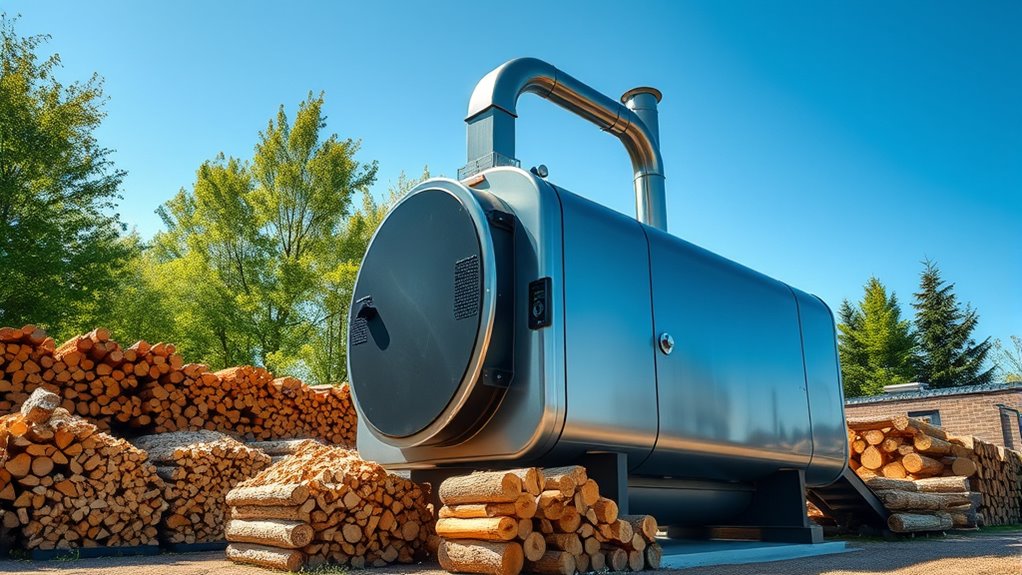
Recent technological advances have considerably boosted biomass boiler efficiency through automation and innovative design. Automated control systems like PLCs and SCADA optimize operation, pushing biomass boiler efficiency to about 80%. Incorporating multi-cyclone dust collectors and water/air preheaters enhances heat recovery, reducing emissions and improving overall plant performance. Modular construction with pre-insulated skid units allows for quicker installation and better operational flexibility. Upgraded fuel handling systems, such as top feeders with fans, minimize fuel loss and accommodate various biomass types, boosting combustion efficiency. Technological innovations like hydrothermal carbonization and torrefaction increase energy density and hydrophobicity, making biomass more sustainable. Additionally, understanding ethical hacking principles can inform the development of secure control systems within biomass plants, ensuring they are protected against cyber threats. This knowledge helps prevent cybersecurity breaches that could disrupt operations or compromise safety. The integration of advanced monitoring systems can further optimize performance, enabling real-time adjustments and predictive maintenance to prevent downtime. Moreover, adopting digital twin technology allows operators to simulate and improve plant processes virtually, increasing overall efficiency and reliability. Furthermore, recent research highlights the importance of human factors engineering in designing control interfaces that reduce operator error and enhance safety.
Practical Applications Across Industries and Communities
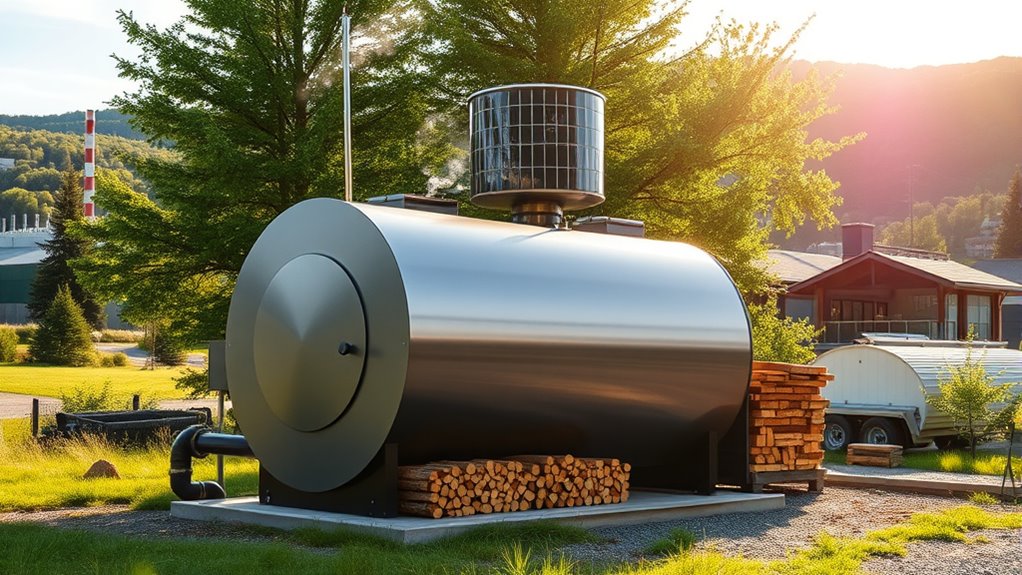
Biomass boilers play a vital role across various industries and communities, providing a sustainable source of process heat and power. They are essential in industrial applications like food processing, pulp and paper, chemicals, and metals, utilizing agricultural waste such as rice husk, sawdust, and bagasse. Communities benefit by using biomass boilers for sustainable heating, reducing reliance on fossil fuels, and lowering emissions. The adaptability of these boilers—from small units of 500 kg/hr to large models exceeding 80 TPH—makes them versatile for diverse needs. They support renewable energy initiatives, promote energy efficiency, and enable power generation across sectors. The increasing adoption of renewable energy sources highlights the importance of biomass boilers in creating a sustainable future. Implementing these systems can also reduce greenhouse gases, contributing to global environmental goals. Enhancing energy efficiency in biomass utilization can further maximize environmental benefits and operational savings. Advances in AI technology are beginning to optimize biomass boiler operations, improving performance and reducing waste. Inspiring words can motivate stakeholders to prioritize renewable solutions like biomass energy, ultimately leading to positive environmental impacts.
Future Perspectives and Policy Support for Biomass Energy
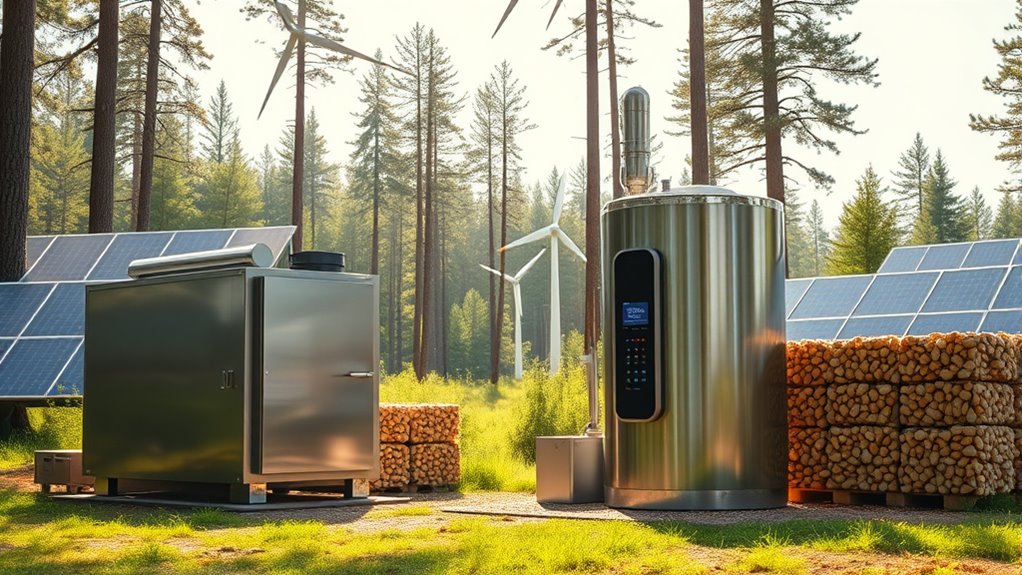
Policy incentives are driving the growth of biomass energy markets, making it easier for you to adopt sustainable heating solutions. Future strategies will focus on developing advanced biomass technologies and expanding market opportunities. Ensuring sustainable resource management will be essential to balance environmental goals with supply chain needs.
Policy Incentives Growth
Government initiatives worldwide are actively shaping the growth of biomass boiler adoption through targeted policies, incentives, and regulatory frameworks. These policy incentives, including government grants, subsidies, and tax benefits, make biomass systems more accessible and attractive. Countries set ambitious renewable energy targets, often aiming for 30-60% renewable share by 2030, which directly boosts market growth. Financial support programs like the US Renewable Heat Incentive encourage installations by offsetting upfront costs. Regulatory measures, such as emissions standards and sustainability criteria, foster industry compliance and confidence.
- Encourage industry innovation through technological advancements
- Drive market confidence with clear emissions standards
- Support sustainable sourcing with strict criteria
- Accelerate adoption via targeted subsidies and grants
- Meet renewable energy targets efficiently
Market Development Strategies
How can future market development for biomass energy be effectively shaped? By leveraging renewable energy policies like the UK’s RHI and BUS, you can accelerate biomass boiler adoption through financial incentives that lower upfront costs. Strengthening industry collaboration is key to developing sustainable supply chains, ensuring consistent fuel quality and availability to support market expansion. Embracing technological advancements, such as efficiency improvements and integration with smart grids, will enhance the competitiveness of biomass boilers. Stricter environmental regulations will push for cleaner solutions, fostering innovation and efficiency. Strategic government incentives combined with ongoing R&D investments can help overcome barriers like infrastructure costs. Together, these efforts will promote a robust, sustainable biomass market aligned with global renewable energy targets.
Sustainable Resource Management
Effective management of biomass resources is vital for sustaining market growth and maximizing environmental benefits. You need to focus on sustainable resource management by strengthening biomass supply chains through responsible forestry practices and waste management. Implementing renewable energy policies and certification standards ensures biomass sourcing aligns with sustainability criteria, reducing carbon emissions and resource depletion. Long-term planning helps prevent ecological damage and promotes a circular economy by encouraging efficient use of residues and waste. International support for advanced biomass technologies also boosts efficiency and environmental performance. To succeed, prioritize:
- Sustainable forestry practices
- Robust waste management regulations
- Certification standards for responsible sourcing
- Policies supporting biomass innovation
- Monitoring to prevent resource depletion
These strategies secure biomass energy’s role as a renewable, eco-friendly solution.
Frequently Asked Questions
Are Biomass Boilers Environmentally Friendly?
You might wonder if biomass boilers are eco-friendly. They are, because they use renewable organic materials like waste wood and crops, which help lower greenhouse gases. When sourced responsibly, they’re nearly carbon-neutral since the CO₂ released is balanced by what plants absorb. Modern models feature emission controls that cut pollutants, making biomass boilers a cleaner, sustainable choice to reduce your environmental impact and fight climate change.
Is Biomass a Sustainable Energy Option?
Imagine you’re planting a garden that grows back every season, providing endless fresh harvests. That’s how biomass works as a sustainable energy source—you use renewable organic materials like wood and crop residues that naturally replenish. When managed responsibly, it creates a balanced cycle, reducing waste and pollution. By choosing biomass wisely, you support a cleaner environment and a circular economy, making it a truly sustainable energy option.
Is Biomass Energy Environmentally Friendly?
You might wonder if biomass energy is truly eco-friendly. It generally is because it uses renewable organic materials that absorb CO₂ as they grow, making its burning nearly carbon-neutral. When you source biomass responsibly and use advanced technology, it reduces pollutants and greenhouse gases compared to fossil fuels. By managing resources carefully, you help prevent environmental harm, support waste reduction, and promote a sustainable cycle of energy use.
What Are the Negatives of Biomass Boilers?
Like a flickering candle in the dark, biomass boilers have their shadows. You might face higher emissions of particulates, NOx, and VOCs if you neglect maintenance. Deforestation risks threaten the environment, and improper handling can cause fuel degradation. The ash buildup demands constant cleaning, and fluctuating fuel quality challenges your operations. These negatives remind you that, while promising, biomass boilers require careful management to truly benefit you and the planet.
Conclusion
So, after all this talk about biomass boilers being the eco-friendly hero, it’s almost funny how they quietly transform waste into warmth. Sure, they reduce emissions and boost sustainability, but don’t forget—they still rely on organic matter. It’s like recycling, but for your heating system. So next time you cozy up with a biomass-powered fire, remember: Mother Earth’s giving you a high-five, while secretly chuckling at how we’re just reusing her leftovers.

